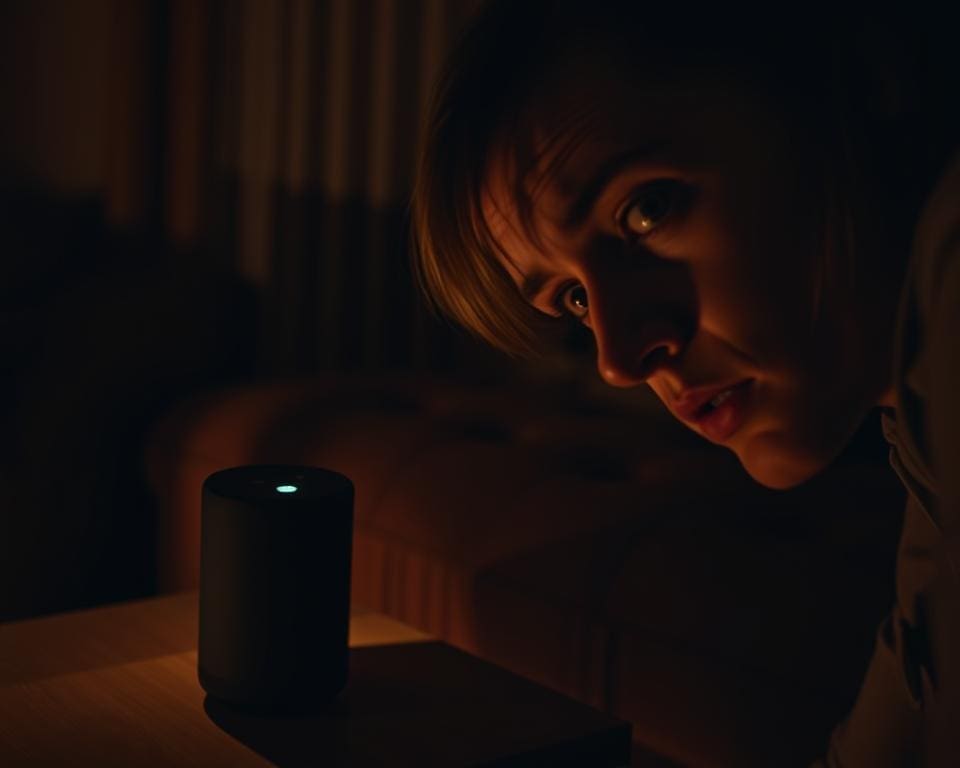As smart speakers, such as Amazon Echo and Google Home, become increasingly prevalent in UK households, many are left questioning: Is your smart speaker gossiping about you? The convenience of having a digital assistant readily available brings with it a host of smart speaker privacy concerns that warrant serious contemplation. These devices are designed to streamline our lives, yet they continuously collect data, raising alarms about digital assistant data privacy.
This article aims to explore the intricacies of smart speaker technology, shedding light on how these devices function and the implications they hold for personal privacy. As we embark on this journey, it is vital to understand the balance between embracing innovation and safeguarding our digital presence.
Understanding Smart Speaker Technology
Smart speakers have revolutionised the way we interact with our environments, providing unprecedented convenience in our daily lives. These internet-connected devices respond to voice commands and offer a range of services, such as music streaming and smart home controls. Understanding the mechanics behind this technology reveals both its benefits and the associated security risks.
What Are Smart Speakers?
Smart speakers are advanced gadgets designed to execute voice commands and perform various tasks. They serve as hubs for controlling smart home devices, accessing information, and delivering entertainment. Leading brands, such as Amazon Echo and Google Nest, have popularised this technology, emphasising user-friendly features that make them essential in modern households.
How Do They Work?
The functionality of smart speaker technology is rooted in sophisticated natural language processing and machine learning algorithms. These systems analyse voice input to understand commands and initiate actions. Voice assistant eavesdropping can occur when the device listens for its wake word, leading to unintentional recordings. Security risks heighten when users are unaware of how often their conversations may be captured and stored in cloud servers.
The Role of Voice Assistants in Everyday Life
Voice assistants, such as Amazon’s Alexa and Apple’s Siri, integrate seamlessly into our routines, providing assistance while simplifying tasks. From setting reminders to controlling smart home gadgets, these technologies exemplify convenience yet come with smart device security risks that may compromise user privacy. An awareness of these challenges is essential for those who embrace the potential of smart speakers.

Is your smart speaker gossiping about you?
The emergence of smart speakers has changed how we interact with technology in our daily lives. Despite their convenience, concerns about voice assistant eavesdropping have surfaced, prompting discussions about privacy implications. Understanding what eavesdropping entails within this context becomes crucial as users navigate their relationship with these devices.
What Does Eavesdropping Mean in This Context?
Eavesdropping, in relation to smart speakers, refers to the unintentional recording of conversations, which can occur when the device mistakenly activates. These devices are designed to listen for specific wake words, yet there are instances where they may inadvertently capture private discussions. This phenomenon raises significant concerns about digital privacy awareness, as users may not realise how often their conversations are being recorded.
Real-Life Instances of Smart Speaker Eavesdropping
Numerous reports reveal unsettling experiences from individuals who discovered their smart speakers had recorded private conversations. Instances include:
- In one case, a user received an unexpected notification from their smart speaker, showcasing a recording of their chat.
- Another individual found their device had been transmitting snippets of family discussions without consent.
Such experiences highlight the potential for smart speaker gossiping, leading to erosion of trust in these technologies. As people become more aware of these issues, they begin to consider measures to protect their conversations. This reflection on personal interaction with smart devices will foster greater digital privacy awareness among users.
Smart Speaker Privacy Concerns
As smart devices become increasingly prevalent in our lives, scrutinising their privacy practices has never been more crucial. Smart speakers, while designed to enhance convenience, raise significant smart speaker privacy concerns related to how user data is collected and used. Many of these devices gather information not merely to improve the user experience but also for advertising purposes, leading to daunting implications for digital assistant data privacy.
A Closer Look at Data Collection Practices
The data collection practices of smart speakers demand attention. Manufacturers like Amazon and Google continuously track user interactions to refine their services, which can lead to a treasure trove of personal information being amassed. This creates a concerning landscape filled with smart device security risks, as the expectations of transparency regarding data handling are frequently unmet. Users may not be fully aware of what data is being collected or the potential repercussions when such information is exposed or exploited.
Among Users: Surveys and Reactions to Data Privacy
User surveys reveal an increasing apprehension surrounding digital assistant data privacy. A considerable percentage of respondents express uneasiness about the breadth of data collected by their devices. Common apprehensions include uncertainties regarding how long their information is stored and the measures in place to protect it. This growing awareness encourages individuals to comprehend their privacy settings better and stay informed about evolving regulations to safeguard personal data in an era dominated by smart devices.
Protecting Home Privacy with Smart Devices
As smart home devices become commonplace, prioritising the protection of home privacy is essential. Users must adopt effective strategies to secure personal information while utilising these innovative technologies.
Effective Strategies for Securing Personal Information
To enhance personal information protection, consider the following approaches:
- Disable voice recording features when not needed, limiting data collection.
- Regularly review and adjust privacy settings to better control shared information.
- Be selective about the data shared with devices, avoiding unnecessary disclosures.
- Utilise strong, unique passwords to prevent unauthorised access to accounts.
The Importance of Regular Software Updates
Regular software updates play a critical role in maintaining the security of cybersecurity smart home devices. Keeping devices updated ensures that security patches are applied promptly. This practice significantly reduces the risk of hacking and data breaches, fortifying protecting home privacy. Understanding one’s devices and being proactive in implementing updates can enhance overall digital security within the home.
Embracing Digital Privacy Awareness
In an age where smart devices weave seamlessly into our lives, cultivating digital privacy awareness is of paramount importance. The rise of smart speakers has brought convenience, yet it simultaneously introduces a myriad of smart device security risks that can compromise our personal information. Understanding these risks empowers users to take control of their digital lives and make informed decisions about the technology they embrace.
Being aware of the evolving landscape of cybersecurity is crucial for safeguarding against potential threats. As we navigate through the intricacies of modern technology, it is essential to educate ourselves about how our information is collected, shared, and potentially exploited. Fostering a culture of vigilance allows us to build a safer digital environment for ourselves and our families, ensuring that our smart devices serve us rather than infringe upon our privacy.
Ultimately, the responsibility for digital safety lies in our hands. By prioritising knowledge and understanding, we can enhance our digital privacy awareness and mitigate the risks associated with smart technology. Let us seize the opportunity to embrace informed choices, cultivate mindfulness around our cyber interactions, and champion a future where our personal data remains secure and respected.









